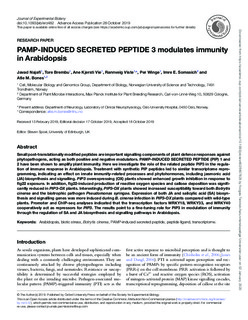| dc.contributor.author | Najafi, Javad | |
| dc.contributor.author | Brembu, Tore | |
| dc.contributor.author | Vie, Ane Kjersti | |
| dc.contributor.author | Viste, Rannveig | |
| dc.contributor.author | Winge, Per | |
| dc.contributor.author | Somssich, Imre | |
| dc.contributor.author | Bones, Atle M. | |
| dc.date.accessioned | 2020-01-14T09:35:00Z | |
| dc.date.available | 2020-01-14T09:35:00Z | |
| dc.date.created | 2018-10-31T16:05:26Z | |
| dc.date.issued | 2019 | |
| dc.identifier.issn | 0022-0957 | |
| dc.identifier.uri | http://hdl.handle.net/11250/2636120 | |
| dc.description.abstract | Small post-translationally modified peptides are important signalling components of plant defence responses against phytopathogens, acting both as positive and negative modulators. PAMP-INDUCED SECRETED PEPTIDE (PIP) 1 and 2 has been shown to amplify plant immunity. Here we investigate the role of the related peptide PIP3 in the regulation of immune response in Arabidopsis. Treatment with synthetic PIP peptides led to similar transcriptome reprogramming, indicating an effect on innate immunity-related processes and phytohormones, including jasmonic acid (JA) biosynthesis and signalling. PIP3 overexpressing (OX) plants showed enhanced growth inhibition in response to flg22 exposure. In addition, flg22-induced production of reactive oxygen species and callose deposition were significantly reduced in PIP3-OX plants. Interestingly, PIP3-OX plants showed increased susceptibility both toward Botrytis cinerea and the biotrophic pathogen Pseudomonas syringae. Expression of both JA and salicylic acid biosynthesis and signalling genes was more induced during B. cinerea infection in PIP3-OX plants compared with wild-type plants. Promoter and ChIP-seq analyses indicated that the transcription factors WRKY18, WRKY33 and WRKY40 cooperatively act as repressors for PIP3. The results point to a fine-tuning role for PIP3 in modulation of immunity through the regulation of SA and JA biosynthesis and signalling pathways in Arabidopsis. | nb_NO |
| dc.language.iso | eng | nb_NO |
| dc.publisher | Oxford University Press (OUP) | nb_NO |
| dc.rights | Navngivelse-Ikkekommersiell 4.0 Internasjonal | * |
| dc.rights.uri | http://creativecommons.org/licenses/by-nc/4.0/deed.no | * |
| dc.title | PAMP-INDUCED SECRETED PEPTIDE 3 (PIP3) modulates immunity in Arabidopsis thaliana | nb_NO |
| dc.type | Journal article | nb_NO |
| dc.type | Peer reviewed | nb_NO |
| dc.description.version | publishedVersion | nb_NO |
| dc.source.journal | Journal of Experimental Botany | nb_NO |
| dc.identifier.doi | 10.1093/jxb/erz482 | |
| dc.identifier.cristin | 1625607 | |
| dc.relation.project | Norges forskningsråd: 250953 | nb_NO |
| dc.description.localcode | © The Author(s) 2019. Published by Oxford University Press on behalf of the Society for Experimental Biology. This is an Open Access article distributed under the terms of the Creative Commons Attribution Non-Commercial License (http://creativecommons.org/licenses/ by-nc/4.0/), which permits non-commercial re-use, distribution, and reproduction in any medium, provided the original work is properly cited. For commercial re-use, please contact journals.permissions@oup.com | nb_NO |
| cristin.unitcode | 194,66,10,0 | |
| cristin.unitcode | 194,66,15,0 | |
| cristin.unitname | Institutt for biologi | |
| cristin.unitname | Institutt for bioteknologi og matvitenskap | |
| cristin.ispublished | false | |
| cristin.fulltext | original | |
| cristin.qualitycode | 2 | |

